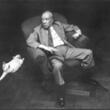The Luminous Novel
(Libby/OverDrive eBook, Kindle)
Available Platforms
Description
‘Perhaps the luminous novel is this thing that I started writing today, just now. Maybe these sheets of paper are a warm-up exercise. [...] But it’s quite possible that if I go on writing – as I usually do – with no plan, although this time I know very well what I want to say, things will start to take shape, to come together. I can feel the familiar taste of a literary adventure in my throat. I’ll take that as confirmation, then, and start describing what I think was the beginning of my spiritual awakening – though nobody should expect religious sermons at this point; they’ll come later. It all began with some ruminations prompted by a dog.’
A writer attempts to complete the novel for which he has been awarded a big fat Guggenheim grant, though for a long time he succeeds mainly in procrastinating – getting an electrician to rewire his living room so he can reposition his computer, buying an armchair, or rather, two: ‘In one, you can’t possibly read: it’s uncomfortable and your back ends up crooked and sore. In the other, you can’t possibly relax: the hard backrest means you have to sit up straight and pay attention, which makes it ideal if you want to read.’
Insomniacs, romantics, and anyone who’s ever written (or failed to write) will fall in love with this compelling masterpiece told by a true original, with all his infuriating faults, charming wit, and intriguing musings.
More Details
Similar Titles From NoveList
Similar Authors From NoveList
Published Reviews
Publisher's Weekly Review
The puzzling second work in English from the late Uruguayan author Levrero (1940--2004, after Empty Words) follows a 60-year-old writer named Mario who's just received a Guggenheim grant. Mario begins keeping a diary until he feels ready to return to what he describes as a "luminous novel," which he started 16 years earlier, but never finished. Mario can't sleep; he plays computer games and downloads pornography; tries to quit smoking and using the computer so much; records and analyzes his dreams; reads detective novels; laments the heat; and more than anything, bemoans that his relationship with "beautiful and seductive" Chl is no longer sexual, even though she still brings him food and occasionally spends the night. What Mario does not do, until nearly a year later, is write the novel, which mainly recounts the women he slept with. Indeed, Mario believes that "these days a novel is practically anything you can put between a front and back cover." It's a credible documentation of writer's block and narcissism, but readers will be left wondering what purpose it serves. This is literature in the same way that John Cage's 4'33" is music. (Aug.)
Kirkus Book Review
A masterwork of meta-referentiality by the late Uruguayan writer Levrero (1940-2004). Our narrator, Levrero himself, is a grumbler of Dostoyevskian proportions, to say nothing of a supremely accomplished procrastinator. He longs for the woman he calls Chl, both confidante and caretaker and a perfectionist: "Chl makes wonderful stews, but she says this one didn't turn out very well; apparently the peas are a bit hard," he grimly observes. Levrero's big problem, consuming him throughout the book, is that he's won a Guggenheim fellowship to write a novel that is overly ambitious to the point of being impossible. "It being impossible wasn't reason enough not to do it, as I knew full well, but the prospect of attempting the impossible made me feel very lazy," he allows. His solution is to invent projects for himself, writing little computer routines to address the manifold shortcomings of Windows 95 (the book was written way back in the day) and of Word 2000, against which he fights quixotic battles. When he's not doing that, he thinks of other ways to procrastinate: fantasize about Chl, to be sure, but also call in an electrician to rewire his flat so that he can move his computer around, the better to play Minesweeper, FreeCell, and Golf at all hours of the day and night. Depressed and ill, our narrator finally concludes that the luminous novel of his dreams is really an autobiography, and life is getting in the way of his writing it. Levrero, a photographer, experimental writer, and humorist, clearly revels in the prospect of writing an unclassifiable novel, as this surely is, but even more clearly he delights in not meeting his obligation to Guggenheim, which, he figures, will accept his explanation that his novel has expanded beyond its original bounds. "Besides, they don't care," he rationalizes, "they just need me to take responsibility for the grant I received, to show the donors that they haven't thrown their money away." Fans of Perec, Coover, and other experimentalists will enjoy Levrero's epic struggle not to write this book. Copyright (c) Kirkus Reviews, used with permission.
Publishers Weekly Reviews
The puzzling second work in English from the late Uruguayan author Levrero (1940–2004, after Empty Words) follows a 60-year-old writer named Mario who's just received a Guggenheim grant. Mario begins keeping a diary until he feels ready to return to what he describes as a "luminous novel," which he started 16 years earlier, but never finished. Mario can't sleep; he plays computer games and downloads pornography; tries to quit smoking and using the computer so much; records and analyzes his dreams; reads detective novels; laments the heat; and more than anything, bemoans that his relationship with "beautiful and seductive" Chl is no longer sexual, even though she still brings him food and occasionally spends the night. What Mario does not do, until nearly a year later, is write the novel, which mainly recounts the women he slept with. Indeed, Mario believes that "these days a novel is practically anything you can put between a front and back cover." It's a credible documentation of writer's block and narcissism, but readers will be left wondering what purpose it serves. This is literature in the same way that John Cage's 4'33" is music. (Aug.)
Copyright 2021 Publishers Weekly.Reviews from GoodReads
Citations
Levrero, M., & McDermott, A. (2021). The Luminous Novel . And Other Stories.
Chicago / Turabian - Author Date Citation, 17th Edition (style guide)Levrero, Mario and Annie McDermott. 2021. The Luminous Novel. And Other Stories.
Chicago / Turabian - Humanities (Notes and Bibliography) Citation, 17th Edition (style guide)Levrero, Mario and Annie McDermott. The Luminous Novel And Other Stories, 2021.
Harvard Citation (style guide)Levrero, M. and McDermott, A. (2021). The luminous novel. And Other Stories.
MLA Citation, 9th Edition (style guide)Levrero, Mario, and Annie McDermott. The Luminous Novel And Other Stories, 2021.
Copy Details
| Collection | Owned | Available | Number of Holds |
|---|---|---|---|
| Libby | 1 | 1 | 0 |
































